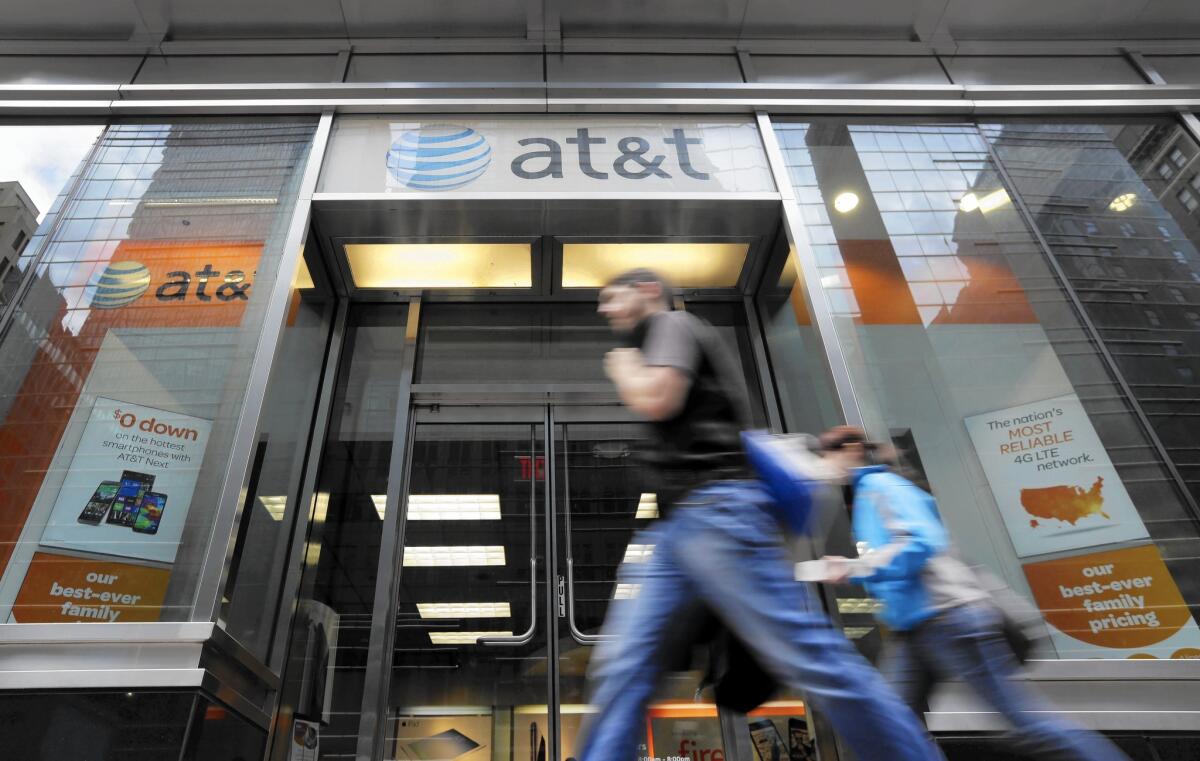Column: Phone companiesâ unlisted-numbers fees are unjustifiable

Imagine if you had to pay extra to not have anchovies on your pizza. Or to not have flames painted on the sides of your car. Crazy, right?
Yet the telecom industry for years has charged landline customers a monthly fee to not have their names listed in phone directories â a recurring fee for a service that isnât being provided and will continue to not be provided at the customerâs request.
Itâs hard to imagine a more brazen consumer rip-off, especially at a time when most people struggle to reduce the volume of telemarketers and robocalls reaching their home.
Thatâs why state lawmakers need to get behind AB 2795, a bill introduced by Assemblywoman Patty Lopez (D-San Fernando). It would prohibit phone service providers in California from charging a fee for unlisted numbers.
Lopez told me her common-sense bill is intended to âprotect consumers from being charged an outdated feeâ that is âa financial burden for Californiaâs low-income residents and seniors living on a fixed income.â
âWhile some consumers continue to pay such fees to safeguard themselves from identity theft, for others it is much more than a matter of privacy,â she said. âFor individuals who are victims of domestic violence or sexual assault, keeping their contact information unlisted is vital to their personal safety.â
AT&T charges customers $1.75 a month to keep their number under wraps. Before Verizon sold its California landlines to Frontier Communications this month, it charged $2.25. Frontier now charges $2.50. Time Warner Cable charges $1.99.
There was a time when compiling phone books â remember those? â was a fairly laborious task and phone companies could make a case for charging a modest fee to maintain customer records.
A decade ago, AT&T charged 28 cents a month for customers to keep their numbers out of the phone book. Itâs fair to assume that the company lost no money at that rate.
Since Californiaâs phone market was deregulated in 2006, AT&Tâs monthly charge for an unlisted number has risen 525%.
Thatâs right: 525%, even though steady improvements in technology have all but eliminated the need for human involvement in record keeping. Phone listings and directory assistance are now almost entirely automated.
While mobile phones are gradually replacing landlines, millions of households statewide still use wired phone service because of its greater reliability. Itâs estimated that 40% of Californians pay extra for unlisted numbers.
âItâs absolutely outrageous,â said Mindy Spatt, a spokeswoman for the advocacy group TURN. âItâs just an opportunity to gouge customers.â
The unlisted-number fee also flies in the face of each companyâs blood oath to protect customersâ privacy.
âOur privacy commitments are fundamental to the way we do business every day,â declares AT&T in its privacy policy.
Says Verizon: âWe are committed to maintaining strong and meaningful privacy protections for customers.â
âAt Frontier,â says Frontier, âwe take your privacy seriously.â
Clearly none of thatâs true. Otherwise each of these companies would charge nothing for customers to safeguard their privacy. At the very least, they wouldnât charge the same month after month for the one-time-only act of registering a customerâs privacy preference.
When phone companies say that your privacy is of utmost importance to them, what they mean is that your privacy is of utmost importance to them as a profit stream.
— Mindy Spatt, spokeswoman for advocacy group TURN
âWhen phone companies say that your privacy is of utmost importance to them, what they mean is that your privacy is of utmost importance to them as a profit stream,â said Spatt.
Iâd love to say that telecom companies make a reasonable case for why they need to charge customers more than $20 a year for an unlisted number. But they donât.
AT&T and Frontier declined to even try, despite my repeated requests this week for an explanation of why the unlisted-number fee needs to be charged on a recurring basis.
Time Warner Cable was the only company with the chutzpah to defend the practice. A spokesman said that âthe fee reflects the cost of employees whose job is to constantly administer and monitor the process of ensuring customersâ unlisted numbers stay that way.â
As for AB 2795, Iâm not holding my breath. For years, well-meaning Sacramento lawmakers have been introducing bills that would outlaw unlisted-number fees, and for years telecom lobbyists have succeeded in killing those bills off.
In the past, phone companies defended the fee as being necessary to help pay for White Pages phone books, which they were required by state law to publish. But guess what? Thatâs no longer the case.
In 2011, Verizon was granted permission by the California Public Utilities Commission to only provide White Pages to customers who ask for a printed directory, which hardly anyone ever does. A year later, the commission granted the same freedom to all other phone service providers.
These companies still have to offer access to directory assistance, but, as I noted, such services are now automated. And of course, most phone companies charge an additional fee for directory assistance, usually about $2.
The simple fact is that thereâs no justification for an unlisted-number fee except to pad the pockets of telecom companies to the tune of millions of dollars a year.
To which their customers say: Privacy is not a profit center.
David Lazarusâ column runs Tuesdays and Fridays. he also can be seen daily on KTLA-TV Channel 5 and followed on Twitter @Davidlaz. Send your tips or feedback to [email protected].
MORE FROM DAVID LAZARUS
Robocalls driving you nuts? A proposed law offers a remedy
Frontier admits California outages are worse than previously thought
Switch to Frontier causes glitches for some former Verizon customers
More to Read
Inside the business of entertainment
The Wide Shot brings you news, analysis and insights on everything from streaming wars to production â and what it all means for the future.
You may occasionally receive promotional content from the Los Angeles Times.











